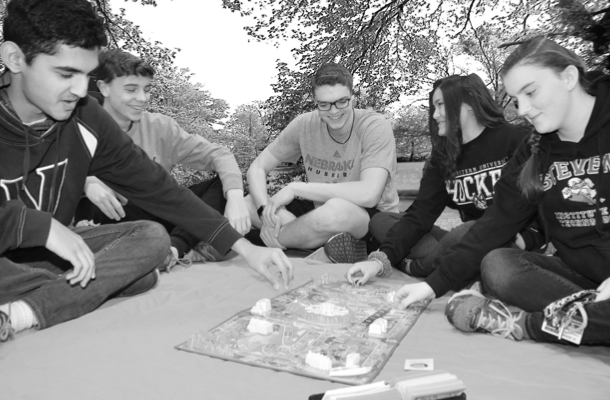Honestly, are you really prepared for college?
According to the “Hechinger Report” by Sarah Butrymowicz, an investigation of forty-four states found that the vast majority of students enrolled in public two and four-year colleges—more than half a million in number—are not ready for college-level work.
There are many different factors that change when one goes to college. “You have a lot of freedom and you need to use it carefully,” anatomy and biology teacher Miss Murray said.
Students are living away from home for the first time and have to deal with the academic transition between high school and college, while figuring out what and who they want to be.
College life is very different from high school. Every choice you make is completely your own. According to the book “The Freshman Survival Guide,” “30% of freshman drop out, and only a little more than half who stay (53%) ever graduate,” and this is mainly due to finances and academics.
There are numerous differences between high school classes and college academics. The biggest contrast is the length of your classes.
Gregory Giovannini, currently attends Rutgers New-Brunswick University. “I took a seminar with less than 20 students that lasted for 3 straight hours,” he said.
In college, your classes will be for longer periods of time but only a few times per week. Hanny Ramadan, a college sophomore at Rutgers-New Brunswick, and an Eastern graduate, says that a college schedule is a lot more overreaching than a high school schedule.
“Because classes are so spread out, in order to really succeed, you have to schedule when you eat, clean your clothes, and sleep especially. It’s a lot more meticulous than a high school schedule.”
Sophie Hill, a college freshman who also attends Rutgers-New Brunswick said, “In many cases, your professors won’t even know your name by the end of the semester. I recommend sitting at the front of all of your big lecture halls; not only will it be easier to pay attention when there are less distractions in front of and around you, but you can form a closer relationship with your professor.”
Professors are also very different from teachers. Their style of teaching differs greatly, “many of them use class engagement more than lecture-slide teaching,” recent Eastern graduate Jami Levinson, who attends The College of New Jersey, said.
According to multiple students, Eastern has prepared them through AP classes and other upper-level work. “Since high school was so rigorous with multiple tests back-to-back and non-stop homework from the time I got home, I was definitely prepared,” Levinson said.
Eastern strives to allow their student to be prepared for college. Mr. Bowne, an English and Journalism teacher said, “Eastern, traditionally, has had dedicated teachers who work hard to make sure that their students have the skills and independence needed to survive and do well in college.”
One of the biggest challenges students will have to face is being away from home. The JED Foundation created a survey titled “The First Year College Experience,” and found that 60 percent of (college) freshman said they wished they had “more help getting emotionally ready for college.”
Hill, who lives an hour away from home stated, “If I need to focus on an exam, I can go home for the weekend. I do miss my family a lot when I’m at school, but they’re always a FaceTime call or a short drive away.”
Going to college is a big change. You have another person living with you, you are surrounded by people you don’t know, and for the rst time you are completely free to make whatever choices you want. This includes what you eat.
Campus food is not the healthiest. Eastern graduate Katie Ramdial, who attends The College of New Jersey said, “When I go home it’s like a 5 star resort.”
Giovannini said, “Being able to eat whatever, whenever, has been a problem.” And for many students this is. There would not be the freshman 15 otherwise.
But there are some ways you can make sure you get your daily dose of green. “Make a commitment to eating something healthy for everything unhealthy you eat. Or just ll up on the good stuff. Live happy. Enjoy life. You’re in college,” Giovannini said.
Students aren’t the only ones have to get prepared for college. Robin Rudolfker, a mother of two children in college, already knew how to be prepared when her oldest son went to college. “I work at a university and see both sides of the process—how students and parents adjust. That perspective helped me approach this situation. I think I was prepared for my oldest child leaving because I was focused on his transition more than my own.”
For parents who have a child going to college, Rudolfker said, “I think it is extremely important to focus on the student and preparing him/her for this next step in their life journey. Yes, it is sad and scary to send a child out into the world to forge new paths without being at their sides. It is, however, a time for parents to feel excitement and think about the possibilities that lie ahead.”
Acclimating to college life for the first time is in many ways scary. “I recommend taking some time throughout high school, especially in the year and months before college, to get a general idea of your own passions, your own habits and tendencies, and your lifestyle,” said Ramadan.
Going to college is one of the biggest transitions you’ll have to make in your life, but it is also a time of excitement. Giovannini said, “It’s okay to be wrong, or to not know what you want to do, or feel lost. That’s all part of it. There is no perfect college experience. It’ll go by in a minute, make it last a lifetime.”


